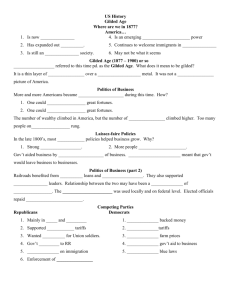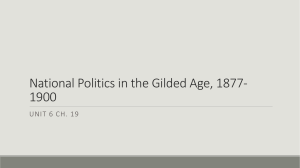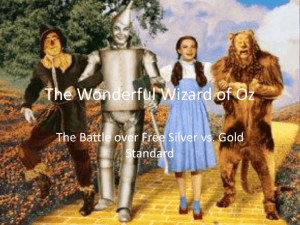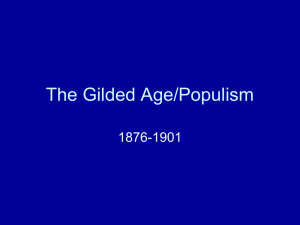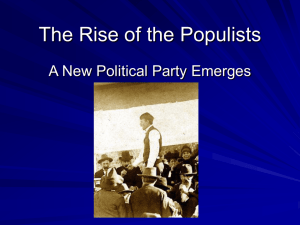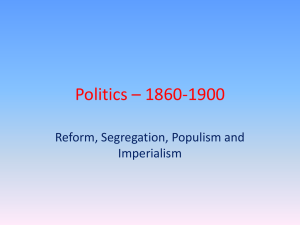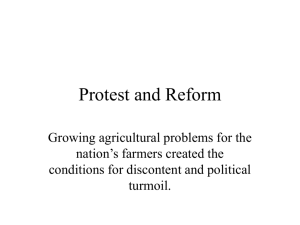Gilded Age Power Point
advertisement
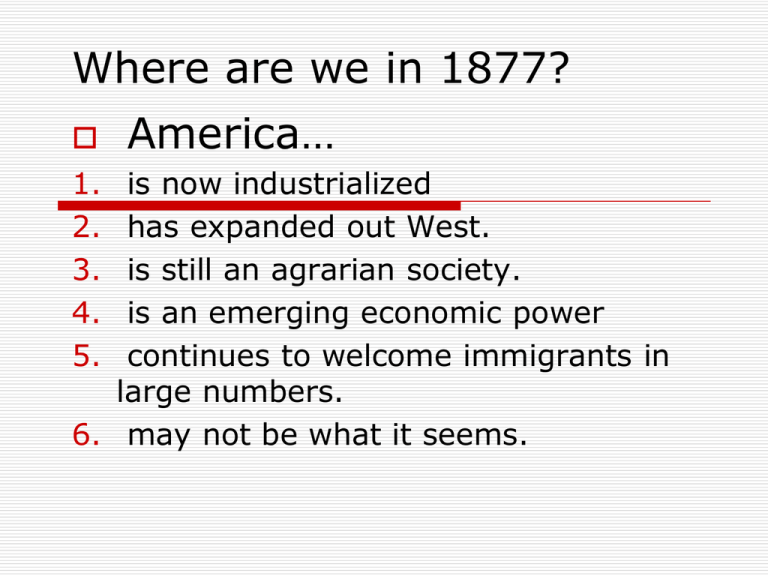
Where are we in 1877? 1. 2. 3. 4. 5. America… is now industrialized has expanded out West. is still an agrarian society. is an emerging economic power continues to welcome immigrants in large numbers. 6. may not be what it seems. Gilded Age (1877 – 1900) or so Mark Twain referred to this time pd. as the Gilded Age. What does it mean to be gilded? It is a thin layer of gold over a worthless metal. It was not a pretty picture of America. Politics of Business More and more Americans became wealthy during this time. How? 1. One could inherit great fortunes. 2. One could make great fortunes. The number of wealthy climbed in America, but the number of poor climbed higher. Too many people on bottom rung. Laissez-faire Policies In the late 1800’s, most gov’t policies helped business grow. Why? 1. Strong economy. 2. More people working. Gov’t aided business by staying out of business. Laissez-faire meant that gov’t would leave business to businesses. Politics of Business (part 2) Railroads benefited from gov’t loans and grants. They also supported political leaders. Relationship between the two may have been a conflict of interest. The Spoils system was used locally and on federal level. Elected officials repaid supporters. Competing Parties Republicans Democrats 1. Mainly in NE and MW 2. Supported high tariffs 3. Wanted pensions for Union soldiers. 4. Gov’t aid to RR 5. Limits on immigration 6. Enforcement of Blue laws 1. 2. 3. 4. Silver backed money Lower tariffs Higher farm prices Less gov’t aid to business 5. Fewer blue laws Reforms Republicans “waved the bloody shirt” for years to get elected. Then, rewarded civil service jobs to friends (as did Dems) Rutherford B. Hayes broke the tradition and offended his party. Strengthened the country, but weakened the Republicans. Election of 1880 Republicans were split Party loyalists Half-breeds – reform spoils system Stalwarts – Keep the same (spoils) Garfield – halfbreed won the nomination and election. Was assassinated in 1881. Arthur became Pres. and ended spoils Pendleton Civil Service Act At the pressing of Arthur, Congress passed this act. Civil Service jobs were to be awarded on merit, not party affiliation. This effectively ended the spoils system started under Jackson. Cleveland Takes Office Dem. Pres. Cleveland took office in 1884. To regulate unfair business practices, Congress created the ICC. It failed to have teeth to force RR to comply to the laws. The economy was floundering. Harrison Wins in 1888 Cleveland was defeated by Harrison. He presided over the first billion $ Congress Surpluses turned into deficits. Harrison pleased his Republican friends by raising tariffs. How do high tariffs help a hurting economy? Coxey’s Army Cleveland won again in 1892. Unemployment was a problem and people marched on Washington. Led by Jacob Coxey, they were arrested for trampling the grass. Harrison’s Presidency Grover Cleveland’s presidency came to a halt in the election of 1888. Benjamin Harrison took the oath in 1889 amid difficult political times. The Federal Treasury had too large a surplus and Harrison and Congress meant to do away with it. Draining the Treasury Pension Act (1890) – Pay more vets and pay them more = more votes for Rep. Sherman Silver Purchase Act (1890) – Gov’t to buy more silver and mint silver $ In return for SSPA, wealthy industrialists secured very high protective tariffs. Democrats got what they wanted and so did Republicans. Populist Movement Election of 1892 Cleveland for Democrats Harrison for Republicans James Weaver Populist platform called for gov’t control of RR’s, telephone, telegraph; shorter work days, one term limit for Pres., and immigration restrictions. Cleveland won… again. Cleveland’s Calamity As soon as Cleveland took office, the U.S. entered the worst depression of the 19th C Silver money, a drained treasury, declining gold, and foreign notes spelled doom. Cleveland repealed the “Silver Act” and alienated his party. J.P. Morgan stepped in to help raise gold for the government. Labor Pains Hardest hit in the depression were small businesses and the factory worker. The gov’t was not in the business of interfering in people’s lives – good or bad Labor strikes were put down by federal troops. Strikers and their leaders were tried and imprisoned. Election of 1896 Republican candidate – William McKinley Democratic/Populist – Wm. J. Bryan McKinley was “propped up” by big business Bryan supported “free silver” ,the agrarian masses as well as the factory worker. In the end, McKinley won. The West & S. for Bryan, the rest for President. McKinley’s Presidency Once in office, the Depression ended and good times were here again. Republicans hailed themselves as the reason for prosperity. Tariffs were raised once more to try and raise revenue. The “free silver” issue died out as did the Populist Movement.
